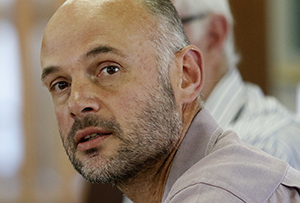Latest News Archive
Please select Category, Year, and then Month to display items
12 January 2024
|
Story Nonsindiswe Qwabe
|
Photo Sonia Small
 Since joining the UFS in 2008, Dr Grey Magaiza has worked extensively on approaches that can foster the socio-economic transformation of societies.
Since joining the UFS in 2008, Dr Grey Magaiza has worked extensively on approaches that can foster the socio-economic transformation of societies.
“The future should be one where communities can decide on their development agenda and futures. That’s the most important for me.” Dr Grey Magaiza, Deputy Director of the Centre for Gender and Africa Studies (CGAS) and Head of the Community Development programme on the Qwaqwa Campus, is passionate about capacitating communities to be agents of change and advancement. His vision for the future emphasises the empowerment of communities to take charge of their development by actively participating in decision making and the implementation of development projects that can improve their lives.
Since joining the UFS in 2008, Dr Magaiza has worked extensively on approaches that can foster the socio-economic transformation of societies. Over the years, he has crafted his research speciality into one that he is most proud of – being an interdisciplinary scientist immersed in the development of communities.
“I’m in a fortunate position of researching what I like. I say ‘fortunate’, because I’ve taken the time to understand what I’m passionate about, which is the overall field of rural livelihoods and livelihood futures – in short, community development. My research starts from an engaged university, understanding the elements that a university must use to enhance transformation and relevance to its immediate community in terms of development.”
One of the ways he has done this is by looking at social entrepreneurship as a development approach for young people in a rural setting. Through workshops with non-profit and civic organisations in Qwaqwa, Dr Magaiza has been helping these organisations to map out their needs and actively meet them through the involvement and support of external role players.
“We understand that communities are part of the national development agenda, but even that national agenda respects community knowledge and intentions and allows communities to shape their identity. A critical enabler of this is community organising. You bring back the capacity in communities to have dialogues on issues affecting them as spaces for engagement, knowledge exchange, and for people to just talk about their way forward.”
By enabling communities to define their development agenda, they can address their specific needs, challenges, and aspirations, he said. “When I look at livelihood futures, it’s quite an exciting aspect of my work – it’s like looking into a fortune tellers’ globe, because you’re not deciding for communities what they should do, but the communities themselves take those decisions.”
Lecturer’s debut novel wins ATKV Prize for Fiction
2015-10-14

Dr Francois Smith
Photo: Johan Roux |
Kamphoer made its debut on the literary scene just over a year ago, and on 11 September 2015, it was declared the best novel by the Afrikaanse Taal en Kultuurvereniging (ATKV). This is not the first time Kamphoer has been recognised as literary gem. Earlier this year, the novel was shortlisted for the W A Hofmeyr Prize as well as the Huisgenoot Tempo Award.
Dr Francois Smith, the author, joined the University of the Free State (UFS) as a lecturer in the Department of Afrikaans and Dutch, German and French at the beginning of this year. Prior to entering the academic sphere, he dedicated about 11 years of his life to editing for a publishing house. Certainly, helping other people write and produce books thoroughly prepared him for authorship.
For three months, Smith spent eight hours a day creating his award-winning masterpiece. The secret of success lies in the ABC formula. “The ABC for writing is Apply Back to Chair. You have to go and sit down and start typing,” he says.
That is when passion meets imagination, albeit at times, one might also need inspiration. Smith applied this winning formula meticulously, and it has resulted in over 30 000 copies of Kamphoer being sold since July 2014.
He was taken aback by the novel’s warm reception. “I wrote a book, finished it, and knew that it wasn’t bad but I never for one moment imagined that it would be such a big commercial success,” he said.
About Kamphoer
The book which Smith describes as a good but not an easy read about a disturbing subject is the true story of a woman who was brutally raped during the South African War and left for dead. After the traumatic experience, she dedicates her life to helping others deal with similar ordeals, re-encountering her rapists in the process.
About the award
Kamphoer emerged as an exceptional contribution amongst two other finalists. Kerneels Breytenbach’s Ester as well as Harry Kalmer’s ’n Duisend stories oor Johannesburg were also competing for the prestigious award.